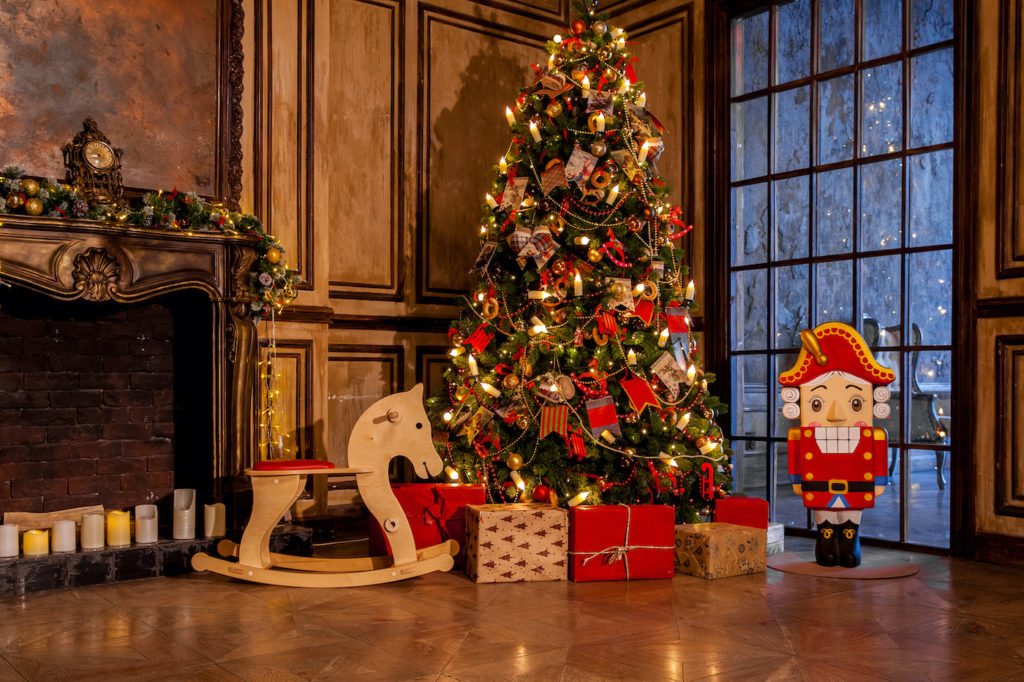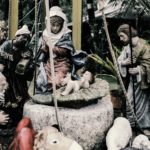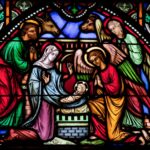Sometimes I think that we should just acknowledge that Christmas and the Holidays are two separate events that happen to coincide on December 25. As an increasing number of writers have noted, the secular world has a liturgical calendar of its own, a rhythm of feasts and seasons that shape our lives and tutor our affections. Furthermore, “Holidays” is an intentional plural designed to prevent potential offense and drain away any religious or cultural particularity. Instead of trying to keep Christ in Christmas or make him the reason for the season, why not just say that we mean two different things by Christmas and the Holidays? As Scrooge might put it, you keep the Holidays in your way, and let me keep Christmas in mine.
Christmas and the Holidays have different calendars, different rituals, and different affections that they cultivate. The Holidays begin the day after Thanksgiving, crescendo until December 25, and then slowly fade before going out with a bang on New Year’s Eve. They are marked by shopping in malls and Holiday markets, family visits to outdoor lights, cocoa in the cold, sitting on Santa’s lap, decorations on the tree, baking cookies, wrapping presents, and then the big unnameable day itself. The Holidays are above all a time of feelings. Anticipation and expectation deepen as December rolls on. Gradually festal feelings fill us: nostalgia for childhood, coziness and warmth, enjoyment of or longing for home, cheer and generosity, loving and being loved, thankfulness for the good things of the past year.
Liturgical Christmas is different. Throughout December, the daily office and the liturgy prepare us for Christ’s first coming in Bethlehem by turning our attention to Christ’s second coming at the end of time. Anticipation builds, but more slowly. Advent has its own carols and hymns, its own ways of showing us how desperate we are for Christ’s humble love and redemption. There are retreats and Rorate Masses in candlelight. Christmas preparations accelerate only during the final week before Christmas, and our cry deepens with the O Antiphons’ litany of our hunger and need. The contrast with the Holidays is clear. Compare the awful thrill of Andrew Carter’s organ variations on “O Come, O Come Emmanuel” with Bruce Springsteen’s canonical rendition of “Santa Claus Is Comin’ to Town,” the best Holiday recording ever made. He is coming, yes, but different he’s, in different ways.
When he comes, he comes in stillness, silence, and awe. We read the story of the shepherds and the manger and St. John unfolding the great mystery of the Incarnation: “And the Word was made flesh and dwelt among us.” This year I found a recording of an improvisation by Olivier Messaien on the Christmas chant “Puer Natus Est Nobis.” He captures the terrifying majesty of the angels—from the first one who struck the shepherds with horror to the multitude of the heavenly host—and the earth-shattering news that a child is born for us, a son given for us.
Start your day with Public Discourse
Sign up and get our daily essays sent straight to your inbox.
And yet for all the heavenly glory, the liturgical coming of Christ takes place in stillness and silence. There is joy the next morning, but the quiet wonder of the feast extends throughout its whole twelve days, gradually diminishing but not quenched until the coming of the magi at Epiphany.
In truth, of course, the Holidays are an attempt to have the accidents of Christmas without its substance. Their warmth and cheer are proper to Christmas, too, and they return to their roots when enjoyed in a liturgical celebration of Christmas. They come from our own imitation of God’s gratuitous generosity, the smallness and simplicity of the infant Christ, the love of God brought down from heaven, and the awestruck affection of the mother and father for the Holy Child.
“Here is the little door,” Frances Chesterton wrote, “lift up the latch, oh lift!” At Christmas, we are reminded of how our own families and the little worlds of our past have served as little doors into the world of the babe lying in the manger.
So it is that every December I find myself reaching for the latch of a house perched on a mountainside in Vermont. The first thing you noticed when you walked in was the smell, a wave of aged hardwood and good cooking carrying the deep warmth of love and hospitality. My grandparents had bought their land from my great-uncle and built a summer house that later expanded into their permanent home. A few years in, they struck an artesian well while digging for water, and my grandfather built a wooden water trough that overflowed underground into a pond. Below the house they planted garden beds and berry bushes and built a log cabin for longer-staying visitors. In the distance loomed mountains squiggled with snow-covered trails.
By the time I came along, the house had come to resemble its inhabitants and was a physical instantiation of my grandparents’ life, the embodiment of the generosity of their marriage. It had a history of its own and offered glimpses into the family’s past. A crucifix Grandpa had carved flanked by candlesticks high above the dining room table was one of the relics of the Catholicism they had left for Pentecostalism; my own return to Catholicism would later provide a key for understanding their history and a desire to recover lost prayers and traditions. Visiting them in winter meant afternoons sledding with cousins and romping in the snow, wandering down to the brook in the woods, and coming back to dry out wet hats and gloves over the woodstove.
Every year on December 24, Grandpa would cut down a tree around sixteen feet tall and bring it from the woods into their living room. They decorated the tree with ornaments, tinsel, and candles. A carved creche from Austria—fine faces on the shepherds, sweeping folds in the fabric of the wisemen—sat on a table at the base. Next to that stood a manger with another of his carvings: a Christ Child rougher hewn but baby-sized, an ideal object for a child’s adoration. In the evenings after Christmas, they would light the candles and those of us present would gather to sing around the tree in its warm, wavering light. Each would choose a carol from youngest to oldest until we closed with “Silent Night,” while Grandpa extinguished the candles one by one.
As I grew older, my Christmas visits brought less sledding and more occasions to deepen my relationship with my grandparents as an adult. As a soprano in the Trapp Family Singers, Grammie had spent a significant part of her youth touring the world with her family. She loved to tell stories, a number of which came from her time on the road. Once as a teenager, “full of the dickens,” she tried to pull her older brother underwater in a hotel pool in Hawaii. When she surfaced, she discovered that she had dunked the Oscar-winning actor José Ferrer.
Singing and touring were tiring work, but my grandmother appreciated the way in which they allowed the family to share the gospel with many around the world. This happened in a particular way in the series of Christmas concerts they sang every year in Washington, New York, and Boston. During the second half of the program, the family would come out one by one carrying lanterns and sing carols seated around a table. The last carol was always “Silent Night,” first a verse in German and then the rest in English. Then one by one they would take their lanterns and file off the stage.
Perhaps our longing for Christmas past reminds us that here we have no lasting city—not even a lasting home.
“People left our Christmas concerts with a real feeling of holiness,” Grammie said later. “They would come backstage and say, ‘Thank you; you have just given me my Christmas.’ And we just knew that God was at work through our concerts.” Once during World War II, they took their lanterns to a hospital ship in New York carrying wounded soldiers. Years later, Grammie’s face lit up as she recounted to me the effect the music had on the men, the healing and quiet joy it brought them, and the way one man who had remained silent since his arrival began to speak after they sang.
I learned that story on one of my final Christmas visits to their home. I had unconsciously expected that the world they created would always be there, but their strength diminished and they could no longer keep up the house as they wanted. It turns out that the pillars of our world are not permanent, but sets that move offstage when an act in life is complete.
Now Grammie and Grandpa lie buried near their old home. My parents are the grandparents, I am the father, and I have sons for whom I seek to build a world of wonder. The crucifix moved from the dining room in Vermont to our bedroom in Connecticut. The door has closed to that room in the past, and it cannot be opened again. Perhaps our longing for Christmas past reminds us that here we have no lasting city—not even a lasting home. In this way, our celebration of Christ’s coming points us toward what it makes possible: our coming to him in heaven, when our longing will be fully satisfied, when we will truly come home.
Nine years ago, my grandparents put up their tree for the last time. I visited them toward the end of the Christmas season, the snow on the ground outside and the house full of its rich warmth. After dinner Grandpa lit the candles and we sat around the tree, each choosing carols to sing. Finally, when we had finished our favorites, the candles were extinguished as we sang “Silent Night.” The last verse ended in darkness and silence. Then, from deep within him, my grandfather breathed out, “Thank you, Lord.”














